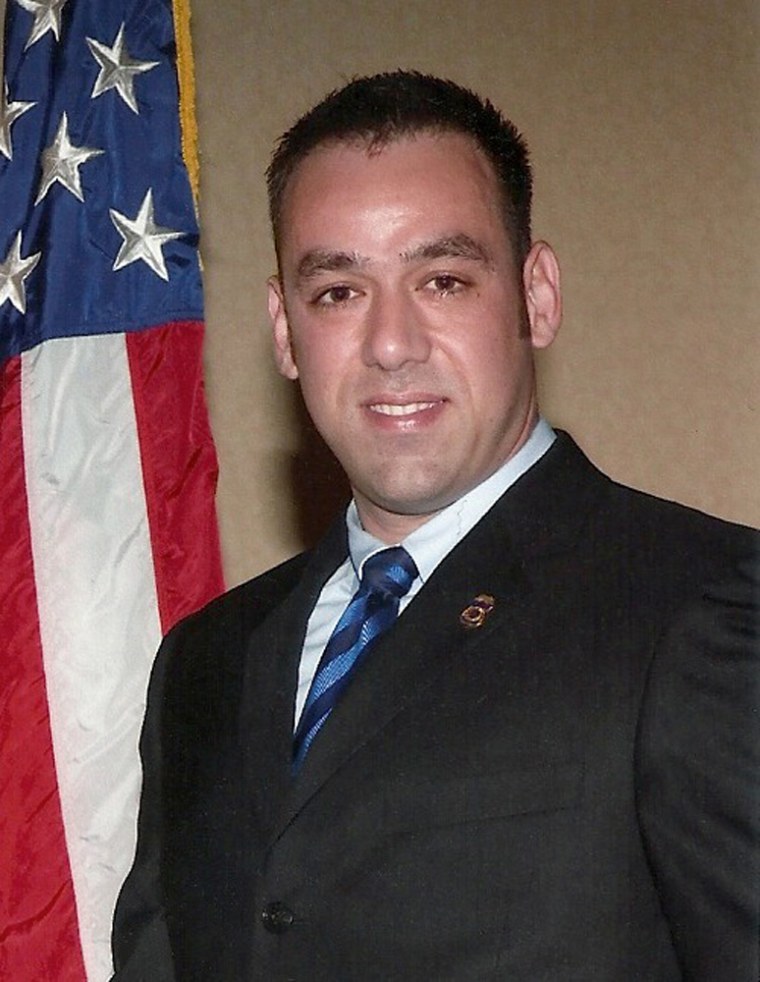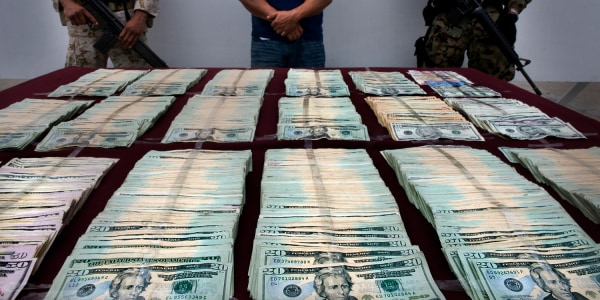Mexican drug gang hitmen shot two U.S. immigration and customs agents, the governor of the state where the men were attacked said Wednesday. If the allegation proves true, such an attack could be a major provocation to the United States.
The uncommon shooting of U.S. officials also highlights the risk such agents face as the United States increases its cooperation with Mexico in battling organized crime. ICE said the two men were the first of its agents shot in the line of duty in Mexico.
Special Agent Jaime Zapata, 32, died Tuesday when gunmen attacked the agents' blue Suburban vehicle as they drove through the northern state of San Luis Potosi. Zapata was on assignment to the Immigration and Customs Enforcement attache in Mexico City from his post in Laredo, Texas.
The Americans were shot in the mid-afternoon, south of the city of San Luis Potosi, which is roughly half way between Mexico City and Monterrey, the country's business capital, where drug-related violence has soared over the past year.
The second agent, Victor Avila, was released from a U.S. hospital after receiving treatment for two gunshot wounds to a leg, federal officials said.
Avila provided a "harrowing and very detailed" account of the attack to a doctor, who was interviewed by Telemundo correspondent Raul Torres.
The two were driving down Highway 57 just outside of San Luis Potosi when they noticed two SUVs following them, the doctor said. The two attackers up behind them at a high rate of speed, "aggressively."
The gunmen started firing at them from inside the two vehicles as they approached, and eventually rammed them off the road. The agent said that he remembers then how one of the men got out, assault rifle in hand, and somehow either through window or door ... went inside their vehicle and opened fire point blank at them.
He took nothing, which would eliminate robbery as reason. They were not ambushed by a "fake" road block, the doctor told Telemundo.
The gunmen apparently knew they were attacking law enforcement officers judging from comments they made before opening fire, a U.S. official told The Associated Press. The law enforcement official refused to reveal the specific comments, but said the blue Suburban had diplomatic plates that also may have indicated who was on board.
Texas Congressman Michael McCaul, who was briefed on the incident as chairman of the Homeland Security Oversight and Investigations Subcommittee, said the gunmen opened fire after the agents identified themselves as U.S. diplomats.
"This was an intentional ambush against two United States federal agents," he said in a statement. "This tragic event is a game changer. The United States will not tolerate acts of violence against its citizens or law enforcement and I believe we must respond forcefully."
Homeland Security Secretary Janet Napolitano said the fatal attack on American law enforcement, the highest-profile since the 1985 torture and killing of DEA agent Enrique "Kiki" Camarena, won't change the U.S. commitment to supporting Mexico in its crackdown on organized crime.
"Let me be clear: Any act of violence against our ICE personnel — or any DHS personnel — is an attack against all those who serve our nation and put their lives at risk for our safety," Napolitano said in a statement. "We remain committed in our broader support for Mexico's efforts to combat violence within its borders."
San Luis Potosi state governor Fernando Toranzo blamed the attack on drug gangs.
"There was an attack where drug gang members ... tried to kill two U.S. officials on a federal highway," Toranzo said in a radio interview.
But federal officials told NBC News' Pete Williams that it's still not clear if the gunmen targeted the men because they were U.S. agents.
It's possible the incident was a carjacking gone awry, as SUVs are highly prized in that area of Mexico, one official told NBC. Texas missionary Nancy Davis shot to death last month in northern Mexico while traveling in a large 2008 Chevrolet pickup, and police believe the attackers were trying to steal the truck.
Additionally, the official told Williams, the area is not under the control of any single cartel, so turf battles have been known to erupt.
U.S. and Mexican officials said they were working closely together to investigate the shooting and find those responsible.
Napolitano and Attorney General Holder said Wednesday they would establish a joint task force between the Department of Homeland Security and the Department of Justice, led by the FBI, to work with Mexico on the investigation.
The two agents were driving a four-lane, federal highway from Mexico City to the northern city of Monterrey on routine business and not as part of an investigation, said a U.S. federal law enforcement official who is not authorized to discuss the case publicly. ICE, the agency for immigration enforcement inside the U.S., also investigates drugs, money laundering and smuggling of weapons and other contraband in Mexico, according to former director Julie Myers.
The agents were stopped at what may have appeared to be a military checkpoint, according to one Mexican official, who was not authorized to speak publicly about the case. Mexican military officers said they had no checkpoints in the area.
After they stopped, someone opened fire on them, the official said.
Television footage showed a blue sports utility vehicle with several large bullet holes sitting in the median of the highway, which was guarded by heavily armed Mexican federal police.
While San Luis Potosi has seen sporadic incidents of drug violence, it borders two states where cartels are waging a bloody fight for territory.
Slideshow 32 photos
Narco culture permeates Mexico, leaks across border
Mexico is fighting heavily armed and powerful drug cartels that supply the U.S. market. Since President Felipe Calderon launched a military crackdown on organized crime shortly after taking office in December 2006, almost 35,000 people have been killed in drug-related violence.
The U.S. has increased equipment and training support for Mexico in recent years through its $1.4 billion Merida Initiative.
As of January last year, 26 ICE special agents also had trained over 4,000 new Mexican police recruits, according to the embassy.
Zapata, who joined ICE in 2006, served on the Human Smuggling and Trafficking Unit as well as the Border Enforcement Security Task Force. He also served as a member of the U.S. Border Patrol in Yuma, Arizona. The agency didn't provide his age but said he was a native of Brownsville, Texas, who graduated from the University of Texas at Brownsville in 2005.
On Wednesday, President Barack Obama called Zapata's parents to give "his and Michelle's heart felt condolences on the loss of their son.," White House spokesman Jay Carney said.
"The President told them that no words could express the sadness of the loss of a loved one, their son served our country admirably," Carney said.
Americans attacked
Though Mexico is seeing record rates of violence, it is rare for U.S. officials to be attacked. The U.S. government, however, has become increasingly concerned about the safety of its employees in Mexico.
In March, an U.S. employee of the American consulate in Ciudad Juarez, her husband and a Mexican tied to the consulate were killed when drug gang members fired on their cars as they left a children's party in the city across from El Paso, Texas.
The U.S. State Department has taken several measures over the past year to protect consulate employees and their families. It has at times authorized the departure of relatives of U.S. government employees in northern Mexican cities.
In July, it temporarily closed the consulate in Ciudad Juarez after receiving unspecified threats. Earlier this month, the consulate in Guadalajara prohibited U.S. government officials from traveling after dark on the road to the airport because of cartel-related attacks in Mexico's second-largest city.
If there is any evidence that drug gangs targeted the two agents, it would mark an escalation in the conflict.
"What we would hope is that there would be an incredibly strong response from the U.S. government ... Otherwise we could have a situation where it's open season on U.S. federal agents at the border," said Steven Camarota of the Center for Immigration Studies in Washington.

